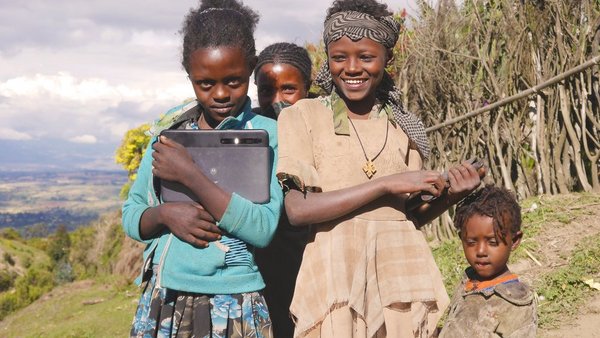- Share this article
- Subscribe to our newsletter
Fast and sustainable: major leaps in development are possible in Africa
The situation on the African continent is difficult. The population is growing rapidly, but the number of jobs is not keeping pace. And the corona virus crisis is making everything even more difficult. This makes it all the more important for Africa to get back on its feet quickly after the pandemic. The options have been available for a long time, as shown by a study presented in July 2020 by the German Berlin Institute for Population and Development, in the form of technical and social innovations creating major advances which make life easier for people, while skipping inefficient, environmentally damaging and expensive intermediate stages as far as possible.
The rapid introduction of mobile phones at the turn of the millennium in places where there were previously no land-line connections was a classic example of leapfrogging. Today, Africans are using cell phones to do their banking, buy insurance or get advice from agricultural and medical information services.
The focus of the study: health – education – agriculture
The study looks at three central areas without which socio-economic development of poor countries is impossible: health, education and agriculture. Because people need to be healthy, qualified and adequately fed if they are to create prospects for themselves and develop their home economies.
“We looked for examples in these areas where African businesses, NGOs or governments have already achieved successes,” says Reiner Klingholz, one of the study’s authors and former director of the Berlin Institute. “It’s important that these ideas and concepts can be applied by Africans for Africans quickly and cheaply.”
Not only modern technological solutions are involved, but also changes and social advances which are very simple but can have major effects. Take the example of rural areas in Ethiopia, where there are neither doctors nor hospitals. Under the Health Extension Programme, a basic health service was established with local health workers, decisively reducing mortality for mothers and children.
In many areas, information and communication technology alone have led to leaps in development or enabled decisive progress in development projects. For example, under the Tusome Programme Kenya is using tablets and a database to track how children are learning. Literacy among elementary school pupils has improved significantly within three years, according to the authors of the study.
Another example is the Siyavula Programme in South Africa. Under the programme, young people can take online courses in mathematics and natural sciences and prepare for their final examinations. The number of Siyavula users has exploded in the coronavirus age.
Leapfrogging in agriculture
Leapfrogging is particularly important in agriculture, because, among other reasons, Africa with its urgent need to catch up needs to avoid making the mistakes industrialised and emerging countries have made in their agricultural development.
How to fill-up the dinner plates more sustainably while creating income at the same time is demonstrated by the Nigerian social enterprise Babban Gona which facilitates access by small-scale farmers to quality seed, fertiliser and pesticides and advises them on using the products. This has enabled farmers in various regions of Nigeria to increase their average yields to 2.3 times the national average.
Advances in the key development areas of health, education and agriculture are not only decisive for managing the demographic challenge in Africa and achieving the Sustainable Development Goals for 2030. “Above all, it’s what Africans want,” emphasises Catherina Hinz, director of the Berlin Institute and co-author of the study. “Surveys show that job creation and a good health and education infrastructure are among the most important concerns of people on the continent.” African governments have the responsibility of creating an environment in which successful leapfrogging in these areas will be possible, Hinz stresses.
(wi/idw)
The original publication:
by Reiner Klingholz, Sabine Sütterlin, Alisa Kaps and Catherina Hinz :
“Schnell, bezahlbar, nachhaltig – wie sich Afrikas Entwicklung beschleunigen lässt”; July 2020 (in German)
More information:
The study is available free in German to download at the website of the Berlin Institute for Population and Development





Add a comment
Be the First to Comment